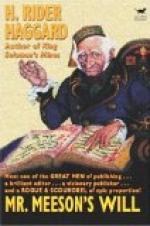The door was answered by the maid-of-all-work, who looked at him a little curiously, but said that Miss Smithers was in, and then conducted him to a door which was half open, and left him in that kindly and agreeable fashion that maids-of-all-work have. Eustace was perplexed, and, looking through the door to see if anyone was in the room, discovered Augusta herself dressed in some dark material, seated in a chair, her hands folded on her lap, her pale face set like a stone, and her eyes gleaming into vacancy. He paused, wondering what could be the matter, and as he did so his umbrella slipped from his hand, making a noise that rendered it necessary for him to declare himself.
Augusta rose as he advanced, and looked at him with a puzzled air, as though she was striving to recall his name or where she had met him.
“I beg your pardon,” he stammered, “I must introduce myself, as the girl has deserted me—I am Eustace Meeson.”
Augusta’s face hardened at the name. “If you have come to me from Messrs. Meeson and Co.”—she said quickly, and then broke off, as though struck by some new idea.
“Indeed no,” said Eustace. “I have nothing in common with Messrs. Meeson now, except my name, and I have only come to tell you how sorry I was to see you treated as you were by my uncle. You remember I was in the office?”
“Yes,” she said, with a suspicion of a blush, “I remember you were very kind.”
“Well, you see,” he went on, “I had a great row with my uncle after that, and it ended in his turning me out of the place, bag and baggage, and informing me that he was going to cut me off with a shilling, which,” he added reflectively, “he has probably done by now.”
“Do I understand you, Mr. Meeson, to mean that you quarrelled with your uncle about me and my books?”
“Yes; that is so,” he said.
“It was very chivalrous of you,” she answered, looking at him with a new-born curiosity. Augusta was not accustomed to find knights-errant thus prepared, at such cost to themselves, to break a lance in her cause. Least of all was she prepared to find that knight bearing the hateful crest of Meeson—if, indeed, Meeson had a crest.
“I ought to apologise,” she went on presently, after an awkward pause, “for making such a scene in the office, but I wanted money so dreadfully, and it was so hard to be refused. But it does not matter now. It is all done with.”




